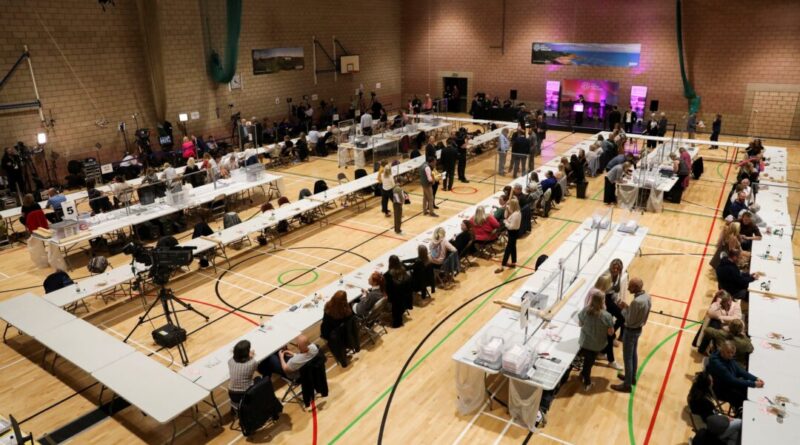General Election: Breaking Records and Reaching Historic Milestones
The Conservatives have experienced their largest drop in MPs from one general election to the next.
The 2024 general election results have been finalized, with the declaration of the final result from Inverness, Skye, and West Ross-shire on Saturday evening.
Below are some key statistics from this election that set new records and marked historic milestones:
Lowest Ever Number of Conservative MPs
A total of 121 Conservative MPs have been elected, the lowest in the party’s history.
This marks a significant decrease from their previous record low of 156 in 1906.
The Tories have suffered a net loss of 251 MPs, dropping from 372 in 2019 to 121 in this election—a notable decline that marks their largest ever drop in MPs from one general election to the next.

One of Labour’s Highest Ever Number of MPs
Labour has secured a total of 412 MPs, marking the party’s third-best performance in terms of seats won, just behind the 413 achieved in 2001 and falling short of the record 419 MPs elected in 1997.
All these numbers include the Speaker of the House.
Labour has seen a net gain of 211 seats compared to the notional total from the 2019 election of 201 MPs, marking the party’s largest increase in MPs from one election to the next since the end of World War II.
In 1945, Labour made its largest leap in MPs, gaining a net of 239 seats.

The Most Liberal MPs for More Than 100 Years
This election has resulted in the highest number of seats won by a Liberal party in over 100 years.
With 72 MPs in the new Commons, the Liberal Democrats have secured more seats than at any other election since the party’s formation in 1988.
This total surpasses any achieved by their predecessors, the Liberals, since the 1923 general election, where the party won 158 MPs.

SNP Reduced to Single Figures for 1st Time Since 2010
The SNP will have only nine MPs in the new Parliament, marking its worst performance at a general election since 2010.
The party had secured a clear majority of seats in Scotland in the 2015, 2017, and 2019 elections, nearly sweeping all 59 seats in 2015 right after the Scottish referendum.
However, the SNP has now been reduced to single digits in the House of Commons, aligning with its past performances in the 1990s and 2000s.

Conservatives Lose Seats They Had Held for Generations
In the 2019 general election, the Conservatives gained seats traditionally held by Labour for many decades, but in this election, both Labour and the Liberal Democrats accomplished the same against the Tories.
Labour’s gains include Aldershot in Hampshire, Macclesfield in Cheshire, Basingstoke in Hampshire, Aylesbury in Buckinghamshire, Ashford in Kent, Cities of London and Westminster, Bournemouth West, and Hexham in Northumberland.
The Lib Dems’ gains consist of Dorset West, Chichester in West Sussex, Woking, Stratford-on-Avon, and Wokingham.
Labour’s Majority is 3rd Largest for a Single Party Since 1900
Labour’s majority of 174 seats is the third-largest won by a single party at a general election since the beginning of the 20th century.
This is slightly below the 179-seat majority won by Labour in 1997 when Tony Blair became prime minister.
The largest majority for a single party since 1900 is 210 seats, achieved by the Conservatives in 1924 under Stanley Baldwin.
Labour Has Lowest Ever Vote Share for Majority-winning Party
While close to securing a record majority of seats, Labour has attained the lowest share of the vote for a party winning a majority in a general election.
With only 33.8 percent of the votes cast, this falls short of the previous record of 35.2 percent set by Labour in the 2005 election when a majority was won.

Conservatives Set New Record for Lowest Ever Vote Share
The Tories’ share of the vote, at 23.7 percent, is the lowest in the party’s history at any general election.
This is a significant decrease from the previous low of 30.7 percent in 1997.

Turnout Down Sharply to Lowest Since 2001
The general election saw a turnout of 59.9 percent, significantly lower than the 67.3 percent recorded in 2019.
This marks the lowest voter turnout since 2001 when it stood at 59.4 percent, the lowest level since before World War II.
- Record-breaking US heatwave and wildfires leave millions sweltering | US News
- French voters head to the polls to decide runoff election





